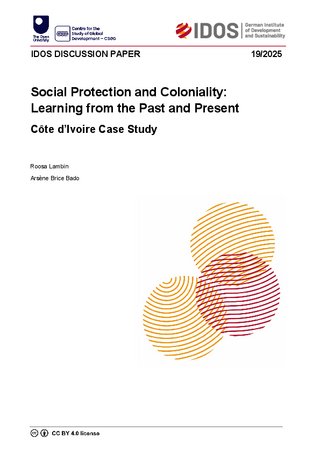Social protection and coloniality: learning from the past and present: Côte d’Ivoire case study
Lambin, Roosa / Arsène Brice BadoDiscussion Paper (19/2025)
Bonn: German Institute of Developemnt and Sustainability (IDOS)
ISBN: 978-3-96021-264-5
DOI: https://doi.org/10.23661/idp19.2025
This case study examines how social protection policymaking in Côte d’Ivoire has been shaped by a complex interplay of colonial legacies, postcolonial ideologies and domestic political-economic dynamics. Through stakeholder interviews and documentary analysis, it offers a nuanced understanding of the development of social protection arrangements in the country.
The findings show that colonial rule established deep structural legacies that continue to constrain the scope and direction of social policy. The French administration embedded economic dependencies – most notably through integration into the CFA franc monetary zone and an economy centred on raw material exports – which continue to restrict the fiscal space needed for comprehensive, state-led social protection. In addition, the legal and administrative architecture introduced under colonialism remains influential, shaping how social protection is conceptualised and implemented. This has fostered an insurance-based model that prioritises formal sector workers, despite Côte d’Ivoire’s large informal economy.
Postcolonial policy influences constitute another, perhaps even more important factor shaping social protection in Côte d’Ivoire. Neoliberal reforms of the 1980s and 1990s, guided by international financial institutions, led to a retrenchment of state welfare functions and cemented external actors’ roles in shaping domestic policy. Today, international partners such as the World Bank, UNICEF and the ILO play key roles in designing social protection strategies and programmes, largely thanks to their technical and financial assistance. At the same time, the country lacks a strong government-owned social policy vision, as the Ivorian development model primarily emphasises economic growth. Yet, some of the primary contemporary reforms – such as universal health coverage (CMU) and social insurance schemes for informal workers (RSTI) – reflect domestic social protection priorities under strong domestic leadership.
The study highlights the need for a stronger government vision to advocate for a holistic social protection framework rooted in local realities. Moving towards a strong, domestically driven social protection expansion also requires strengthening domestic resource mobilisation, reducing reliance on external debt and leveraging regional cooperation. Collaboration with civil society organisations and leveraging informal social protection arrangements can also help develop and deliver contextually appropriate and inclusive social protection.

